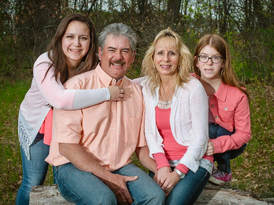 The Place For Us To Be It’s difficult to truly understand the challenges that accompany a traumatic brain injury; not only for the affected individual, but for the family as well. The life-changing diagnosis can leave parents feeling alone, uncertain and frightened about what the future holds. Such is the case with Sharon and her daughter, Samantha, who was born with anoxia (a lack of oxygen to the brain), which resulted in an encephalopathy that damaged the brain’s speech center. Samantha was unable to utter an understandable word until she was four years old. As she grew into adolescence, Samantha faced countless struggles to develop social, planning and judgment skills. Daycare and special education classes often didn’t meet her individual needs. Ten years of speech therapy resulted in dismissive attitudes from therapists who thought she’d reached her maximum potential. “It’s hard for people, and even some therapists, to understand a brain-related disability,” said her mother. “The automatic assumption that they’re intellectually impaired couldn’t be further from the truth.” Sharon, a registered nurse of more than 30 years, said that Samantha comprehends and understands, and that it’s important that she not be treated at a lower level. “Don’t ever tell a parent their child has reached his or her maximum potential!” Samantha’s injury also caused fine and gross motor deficits that made routine daily activities unmanageable without constant care. Aside from younger sister, Alexis, Sharon and her husband Bill were totally responsible for Samantha’s round-the-clock care. “Those entire 19 years were a challenge, but we did what any parents would do for their child,” said Sharon. “After she graduated from high school, Samantha tried several different vocational programs but none were a good fit and this left her with too much unstructured time during the day. We became quite concerned about her safety and vulnerability.” Early in her nursing career (30 years ago), Sharon worked as an RN with a PCA agency so she understood that in-home care was a complicated process, requiring a certain level of comfort and communication between agency and client. Despite this knowledge, she felt like she was venturing into the unknown in searching for assistance with Samantha’s care. That search led her to A Chance To Grow, where she learned about the agency’s custom care plans for children and adults. “I saw the wealth of services they offered - not just PCA services - and it was clear they took a vested interest in all aspects of a child’s care,” said Sharon. “The first time I came in, I picked up a list of symptoms they treat and was shocked to find that it perfectly described my daughter! No doctor or therapist had ever described my child in this way.” Soon after her initial visit, Sharon discovered the Home-Based Services department was hiring a nursing position. “I realized I could be my daughter’s PCA and work for this wonderful agency at the same time,” she said, “I knew immediately this was the place for us to be.” In 2014, Sharon joined the ACTG team as an RN Case Manager, responsible for supervising PCAs, meeting with families and creating custom care plans. She and Alexis also serve as Samantha’s PCA, helping her complete daily living activities, participate in community social functions, and learn independent living skills. Sharon sees growth in the little things Samantha does; picking out her own clothes, making her own purchases at the store, or washing the dishes. “There’s no nice timeline,” said Sharon. “Every day with Samantha is different, but she continues to grow and make progress…but it’s on her timeline. A Chance To Grow understands that and has embraced her for who she is and the strengths she has.” That’s not to say there aren’t difficult days. Sequencing activities and social boundaries are still a challenge, but through ACTG’s PCA program, Sharon is able to help Samantha face those obstacles in a supportive environment. “It’s mutually beneficial to be able to meet the needs of my daughter and support other families’ needs too,” Sharon said. “ACTG makes such a difference in the lives of its clients. I get so much enjoyment developing relationships with families and helping them and their loved ones navigate difficult situations.” Sharon strongly recommends ACTG’s PCA program when seeking in-home care for their loved ones. “At A Chance To Grow, we’re so focused on our clients.” she said. “From communication to paperwork, we are all attentive and aware of the comfort and flexibility that families like ours need. Most importantly, ACTG accepts your knowledge of your child-- like no one else can. It’s been an amazing partnership.”
14 Comments
|
Authors
Archives
June 2024
Categories
All
|

 RSS Feed
RSS Feed